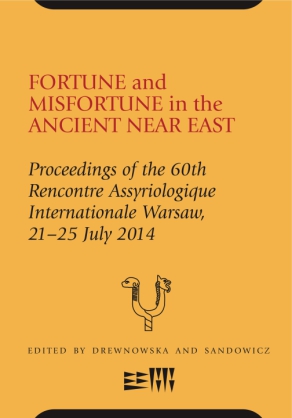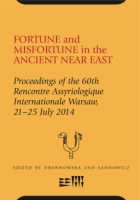
Fortune and Misfortune in the Ancient Near East
Proceedings of the 60th Rencontre Assyriologique Internationale Warsaw, 21–25 July 2014
Edited by Olga Drewnowska and Małgorzata Sandowicz
Fortune and Misfortune in the Ancient Near East
Proceedings of the 60th Rencontre Assyriologique Internationale Warsaw, 21–25 July 2014
Edited by Olga Drewnowska and Małgorzata Sandowicz
In the week between July 21 and 25, 2014, the University of Warsaw hosted more than three hundred Assyriologists from all over the world. In the course of five days, nearly 150 papers were read in three (and sometimes four) parallel sessions. Many of them were delivered within the framework of nine thematic workshops. The publication of most of these panels is underway, in separate volumes. As is usually the case, the academic sessions were accompanied by many opportunities for social interaction among the participants, and there was time to enjoy the historical and cultural benefits of Warsaw. Special honor was accorded to two American Assyriologists whose origins can be traced to Warsaw, Piotr Michalowski and Piotr Steinkeller, and a special session to recognize their contributions to the study of ancient Mesopotamia was organized.
- Description
- Table of Contents
In this book are presented papers on the main theme of the meeting, “Fortune and Misfortune in the Ancient Near East.” The 31 essays are organized into 5 sections: (1) plenary presenations on “What Is Fortune? What Is Misfortune?”; (2) humanity and fortune/misfortune and luck, with discussion of specific examples; (3) additional papers on definitions of fortune and misfortune; (4) the effects on city and state; and (5) God and temple.
Abbreviations
Program
Introduction
Part 1
What Is Fortune?
What Is Misfortune?
Luck, Fortune, and Destiny in Ancient Mesopotamia or How the Sumerians and Babylonians Thought of Their Place in the Flow of Things—Piotr Steinkeller
The Concept of "Misfortune" in Sumerian Wisdom Literature—Jacob Klein
Man's Fate: Divine Responsibility for Human Welfare in Hatti—Gary Beckman
Part 2
Man
Fortune and Misfortune of the Individual: Some Observations on the Sufferer's Plaint in Ludlul bel nemeqi II 12–32—Tzvi Abusch
On the Fortune—or Misfortune—of Having Children: The Abundance of Children According to the Omen Text K. 6403—Nils P. Heeßel
Gendering for Fortune and Misfortune: Ritual Gender Assignment in the Ancient Near East—Kathleen McCaffrey
Why Did Paškuwatti's Patient Fail in the Matrimonial Bed?—Zsolt Simon
Introduction aux symptômes mentaux en Mésopotamie—Magalie Parys
Legal Remedies against Misfortune: Evasion, Legal Fiction, and Sham Transactions in Late Bronze Age Emar—Lena Fijałkowska
Hierarchy at the Hittite Court—Tayfun Bilgin
Fortunes and Misfortunes of Messengers and Merchants in the Amarna Letters—Graciela Gestoso Singer
Made Men: Rich Slaves of the Nur-Sins and the Egibis—Benjamin Dromard
Betting on the Right Horse: Loyalty in the Early Years of the Neo-Babylonian Empire—Yuval Levavi
Part 3
King
The Origins of the LUGAL Office—Petr Charvát
Ups and Downs in the Career of Enmerkar, King of Uruk—Dina Katz
"Sulgi, Mighty Man, King of Ur"—Tonia Sharlach
The Fate of Yasmah-Addu, the King of Mari—Rafał Kolński
Finding the Good Genius in Your Bowl—Daniel Bonneterre
The Royal Adoption Scene in Ugaritic and Biblical Texts—Joanna Töyräänvuori
"One Epic or Many?" Das Tukulti-Ninurta-Epos zum Ersten, zum Zweiten und zum...?—Stefan Jakob
Part 4
City and State
Climate Change, the Mardu Wall, and the Fall of Ur—Minna (Lönnqvist) Silver
Regional Differences in Middle Assyrian—Jacob Jan de Ridder
The Anatolian and Iranian Frontiers: Analyzing the Foreign Policy of the Assyrian Empire under Esarhaddon—Selim Ferruh Adalı
Finis Assyriae: The Fall of the Assyrian State, or the Fall of the Assyrian Civilisation?—Stefan Zawadzki
Fortune and Politics: Nabopolassar's Campaigns in 616–615 BCE and His Alliance with Media—Kabalan Moukarzel
More about the Crisis in Uruk—Radosław Tarasewicz
Part 5
God and Temple
Don't Insult Inana! Divine Retribution for Offense against Common Decency in the Light of New Textual Sources—Jana Matuszak
Fortune and Misfortune of the Eagle in the Myth of Etana—Evelyne Koubková
Within the Ekur: Sitz im Leben for a Literary Topos Regarding Nintur—Mark A. Avila, Marcel Sigrist, and Uri Gabbay
Some Remarks on the Archaeology of the Ekur of Nippur during Post-Kassite Times—Bernhard Schneider
Mailing List
Subscribe to our mailing list and be notified about new titles, journals and catalogs.



